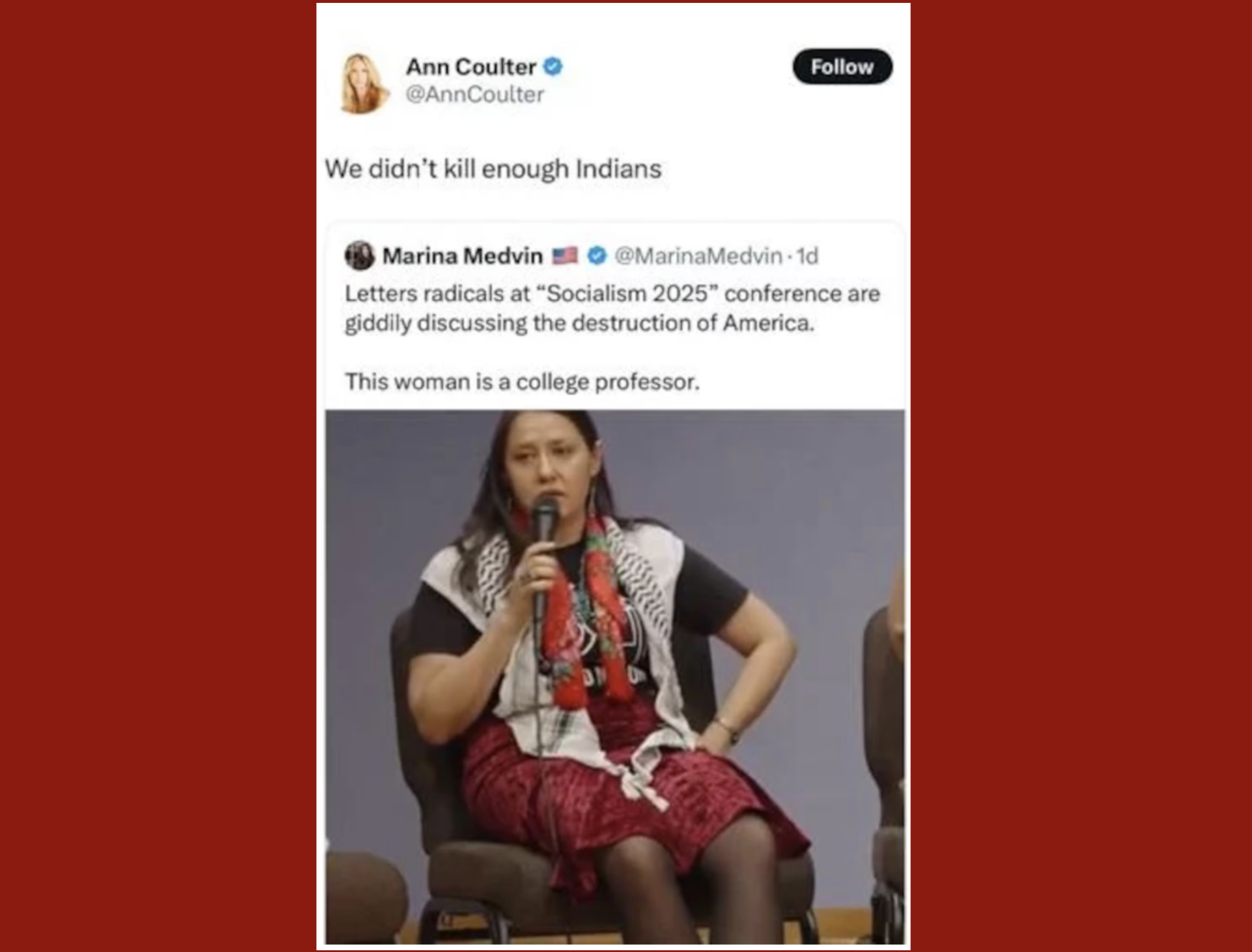
- Details
- By Kaili Berg
Conservative pundit Ann Coulter ignited widespread outrage over the weekend after posting on X (formerly Twitter) that “we didn’t kill enough Indians,” a statement many Indigenous leaders condemned as genocidal hate speech.
The post came in response to a clip from the Socialism 2025 conference, where Diné professor and activist Melanie Yazzie discussed Native sovereignty. Coulter’s one-line reply, delivered to her 2.3 million followers, quickly went viral.
Tribal leaders and journalists expressed their ire for Coulter's racist comments, including National Congress of American Indians President Mark Macarro, who is the chairman of the Pechanga Band of Indians.
"Celebrating genocide against tribal nations crosses every moral line. Careless comments like this glorify, the darkest chapters of US history and actively endanger Native peoples' lives today. We will not sit back silently at attempts to normalize abhorrent behavior," said Macarro.
Cherokee Nation Principal Chief Chuck Hoskin, Jr. called Coulter’s tweet a despicable rhetorical shot on trained on First Peoples of this continent.
"Such rhetoric has aided and abetted the destruction of tribes, their life ways, languages and cultures, the violation of treaty rights, violence, oppression, suppression and dispossession. It should not be lost on any of us that Coulter’s lament that “we didn’t kill enough Indians” takes place against the backdrop of our relatively low average life expectancies, high suicide rates and the epidemic of missing and murdered indigenous people, just to name a few aspects of our continuing struggle," Hoskin said.
Rebecca Nagle, Cherokee journalist and advocate, said the remark reflects a broader pattern of racism deployed for attention.
“Comments like this are really racist and really harmful,” Nagle told KOSU. “And it’s all just to get likes, to rev up her base at the expense of Indigenous lives and dignity.”
Tasha Mousseau, vice president of the Wichita and Affiliated Tribes, described the tweet as part of the long shadow of colonial violence. “In Indian Country, we are still here, thriving, and we are our ancestors’ wildest dreams,” she said.
The Native American Rights Fund (NARF) Executive Director John EchoHawk (Pawnee) issued a statement calling Coulter’s words “ignorant, immoral, and unacceptable,” noting that such statements normalize violence and dehumanization.
“It is chilling to see such rhetoric still broadcast by prominent figures in 2025,” the statement read. “This is a moment for all Americans to say: enough.”
Even the Oklahoma Democratic Party released a statement condemning Coulter, calling her post “beyond disgusting” and urging a boycott of her appearances and books.
For many, Coulter’s words were especially painful because they evoke centuries of state-sanctioned violence against Native peoples, from massacres and forced removals like the Trail of Tears to the boarding school era’s cultural genocide.
“She’s celebrating what our people endured and survived,” said Nagle. “That’s why it cuts so deep.”
While X initially placed a content warning on the tweet for violating its policies against hateful conduct, it remained visible for over 24 hours, raising questions about the platform’s willingness to enforce its own rules.
Coulter has not publicly apologized or retracted her statement.
More Stories Like This
Native News Weekly (August 25, 2024): D.C. BriefsUS Presidents in Their Own Words Concerning American Indians
Next on Native Bidaské: Julian Brave NoiseCat on the Lumbee Nation’s 140-Year Fight for Federal Recognition
Hackers Compromise Native News Online Facebook Page
‘His stories can no longer be told.’ | Woman Pleads Guilty to 2016 Murder of Indigenous Master Woodcarver
Help us defend tribal sovereignty.
At Native News Online, our mission is rooted in telling the stories that strengthen sovereignty and uplift Indigenous voices — not just at year’s end, but every single day.
Because of your generosity last year, we were able to keep our reporters on the ground in tribal communities, at national gatherings and in the halls of Congress — covering the issues that matter most to Indian Country: sovereignty, culture, education, health and economic opportunity.
That support sustained us through a tough year in 2025. Now, as we look to the year ahead, we need your help right now to ensure warrior journalism remains strong — reporting that defends tribal sovereignty, amplifies Native truth, and holds power accountable.
 The stakes couldn't be higher. Your support keeps Native voices heard, Native stories told and Native sovereignty defended.
The stakes couldn't be higher. Your support keeps Native voices heard, Native stories told and Native sovereignty defended.
Stand with Warrior Journalism today.
Levi Rickert (Potawatomi), Editor & Publisher


